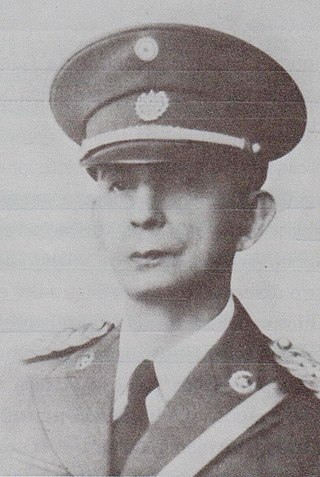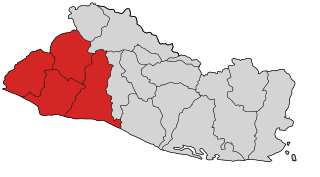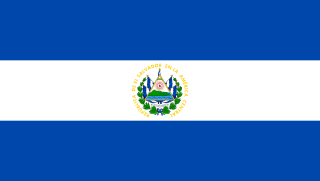| |||||
| Decades: | |||||
|---|---|---|---|---|---|
| See also: | |||||
The following lists events that happened in 1939 in El Salvador .
| |||||
| Decades: | |||||
|---|---|---|---|---|---|
| See also: | |||||
The following lists events that happened in 1939 in El Salvador .

Maximiliano Hernández Martínez was a Salvadoran military officer and politician who served as the president of El Salvador from 4 December 1931 to 28 August 1934 in an acting capacity and again in an official capacity from 1 March 1935 until his resignation on 9 May 1944. He was the leader of El Salvador during World War II. While he served as President Arturo Araujo's vice president and defense minister, a directorate seized power during a palace coup and afterwards named Hernández Martínez president of El Salvador.

Fernando Figueroa was the President of El Salvador from 14 May to 18 June 1885 and again from 1 March 1907 to 1 March 1911. He also served twice as Minister of National Defense and Governor of San Vicente.

Osmín Aguirre y Salinas was a Salvadoran military officer and politician who served as the provisional president of El Salvador from 21 October 1944 until 1 March 1945. A Colonel in the Salvadoran Army, Aguirre y Salinas led two successful coups against the Salvadoran government: once in 1931 and again in 1944. He left office in 1945, with the assurance that his successor in the next election would be Salvador Castaneda Castro. He was later assassinated near his home in San Salvador at the age of 87.

La Matanza refers to a communist-indigenous rebellion that took place in El Salvador between 22 and 25 January 1932. It was succeeded by large-scale government killings in western El Salvador, which resulted in the deaths of 10,000 to 40,000 people.

The Salvadoran military dictatorship was the period of time in Salvadoran history where the Salvadoran Armed Forces governed the country for almost 48 years from 2 December 1931 until 15 October 1979. The authoritarian military dictatorship limited political rights throughout the country and maintained its governance through rigged and fixed elections.

The National Party of the Fatherland, usually translated as the National Pro Patria Party or simply the Pro Patria Party, was a far-right political party which was the sole-legal political party in El Salvador from its establishment in 1933 until its dissolution in 1945. The party was founded by President General Maximiliano Hernández Martínez to support his government.

The Civic Directory was a military junta which governed El Salvador from 2 to 4 December 1931. The junta was composed of twelve members of the Armed Forces of El Salvador from the army, air force, and National Guard. The directory marked the beginning of the era of military dictatorships in El Salvador which lasted until October 1979 with the 1979 Salvadoran coup d'état and the establishment of the Revolutionary Government Junta, a joint civilian-military government which ruled until 1982.
The following lists events that happened in 1931 in El Salvador.
The following lists events that happened in 1932 in El Salvador.
The following lists events that happened in 1934 in El Salvador.
The following lists events that happened in 1935 in El Salvador.
The following lists events that happened in 1936 in El Salvador.
The following lists events that happened in 1938 in El Salvador.
The following lists events that happened in 1944 in El Salvador.
Death squads in El Salvador were far-right paramilitary groups acting in opposition to Marxist–Leninist guerrilla forces, most notably of the Farabundo Martí National Liberation Front (FMLN), and their allies among the civilian population before, during, and after the Salvadoran Civil War. The death squads committed the vast majority of the murders and massacres during the civil war from 1979 to 1992 and were heavily aligned with the United States-backed government.
The National Republican Party was a Salvadoran political party that existed from 1930 to 1931.

Joaquín Valdés was a Salvadoran military officer who served as the Minister of National Defense from 1931 to 1935 and as Co-chairman of the Civic Directory in December 1931.

The Palm Sunday Coup was an attempted military coup d'état in El Salvador which occurred in early-April 1944. The coup was staged by pro-Axis sympathizers in the Salvadoran Army against President General Maximiliano Hernández Martínez.
Anarchism in El Salvador reached its peak during the labour movement of the 1920s, in which anarcho-syndicalists played a leading role. The movement was subsequently suppressed by the military dictatorship before experiencing a resurgence in the 21st century.